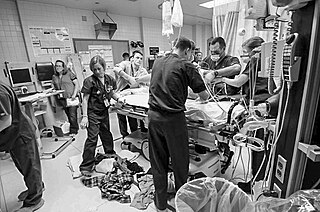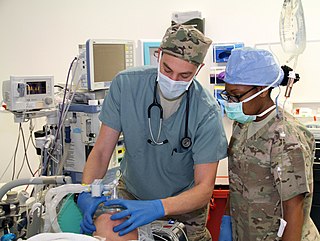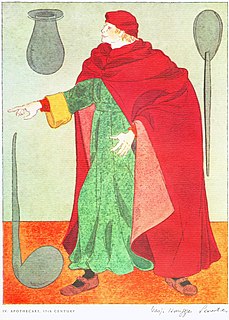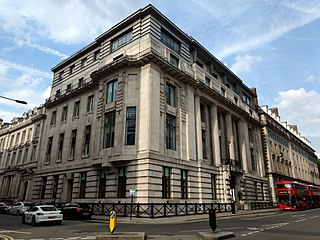
Medicine is the science and practice of establishing the diagnosis, prognosis, treatment, and prevention of disease. Medicine encompasses a variety of health care practices evolved to maintain and restore health by the prevention and treatment of illness. Contemporary medicine applies biomedical sciences, biomedical research, genetics, and medical technology to diagnose, treat, and prevent injury and disease, typically through pharmaceuticals or surgery, but also through therapies as diverse as psychotherapy, external splints and traction, medical devices, biologics, and ionizing radiation, amongst others.

Emergency medicine, also known as accident and emergency medicine, is the medical specialty concerned with the care of illnesses or injuries requiring immediate medical attention. Emergency physicians care for unscheduled and undifferentiated patients of all ages. As first-line providers, their primary responsibility is to initiate resuscitation and stabilization and to start investigations and interventions to diagnose and treat illnesses in the acute phase. Emergency physicians generally practice in hospital emergency departments, pre-hospital settings via emergency medical services, and intensive care units, but may also work in primary care settings such as urgent care clinics. Sub-specializations of emergency medicine include disaster medicine, medical toxicology, ultrasonography, critical care medicine, hyperbaric medicine, sports medicine, palliative care, or aerospace medicine.

In the medical profession, a general practitioner (GP) is a medical doctor who treats acute and chronic illnesses and provides preventive care and health education to patients.

Pharmacy is the science and technique of preparing, dispensing, and review of drugs and providing additional clinical services. It is a health profession that links health sciences with pharmaceutical sciences and aims to ensure the safe, effective, and affordable use of drugs. The professional practice is becoming more clinically oriented as most of the drugs are now manufactured by pharmaceutical industries. Based on the setting, the pharmacy is classified as a community or institutional pharmacy. Providing direct patient care in the community of institutional pharmacies are considered clinical pharmacy.

The Worshipful Society of Apothecaries of London is one of the livery companies of the City of London. It is one of the largest livery companies and ranks 58th in their order of precedence.

The Royal College of Physicians is a British professional body dedicated to improving the practice of medicine, chiefly through the accreditation of physicians by examination. Founded in 1518, it set the first international standard in the classification of diseases, and its library contains medical texts of great historical interest.

Anesthesiology, anaesthesiology, anaesthesia or anaesthetics is the medical speciality concerned with the total perioperative care of patients before, during and after surgery. It encompasses anesthesia, intensive care medicine, critical emergency medicine, and pain medicine, with the study and use of anesthesia and anesthetics being its core element. A physician specialised in this field of medicine is called an anesthesiologist, anaesthesiologist or anaesthetist, depending on the country.
A Doctor of Medicine is a medical degree, the meaning of which varies between different jurisdictions. In the United States, Canada and other countries, the MD denotes a professional graduate degree awarded upon graduation from medical school. In the United Kingdom, Ireland and other countries, the MD is a research doctorate, higher doctorate, honorary doctorate or applied clinical degree restricted to those who already hold a professional degree in medicine; in those countries, the equivalent professional degree is typically titled Bachelor of Medicine, Bachelor of Surgery (MBBS).
A medical school is a tertiary educational institution, or part of such an institution, that teaches medicine, and awards a professional degree for physicians and surgeons. Such medical degrees include the Bachelor of Medicine, Bachelor of Surgery, Doctor of Medicine (MD), or Doctor of Osteopathic Medicine (DO). Many medical schools offer additional degrees, such as a Doctor of Philosophy (Ph.D), Master's degree (M.Sc), a physician assistant program, or other post-secondary education.
The Medical University of Łódź was founded on October 1, 2002 as a merger of the Medical Academy of Łódź and the Military Medical Academy of Łódź . It is the largest teaching hospital unit in Poland and a European research center.

Residency or postgraduate training is a stage of graduate medical education. It refers to a qualified physician, podiatrist, or dentist who practices medicine, usually in a hospital or clinic, under the direct or indirect supervision of a senior clinician registered in that specialty such as an attending physician or consultant. In many jurisdictions, successful completion of such training is a requirement in order to obtain an unrestricted license to practice medicine, and in particular a license to practice a chosen specialty. An individual engaged in such training may be referred to as a resident, house officer, registrar or trainee depending on the jurisdiction. Residency training may be followed by fellowship or sub-specialty training.

Apothecary is one term for a medical professional who formulates and dispenses materia medica to physicians, surgeons, and patients. The modern pharmacist has taken over this role. In some languages and regions, the word "apothecary" is still used to refer to a retail pharmacy or a pharmacist who owns one. Apothecaries' investigation of herbal and chemical ingredients was a precursor to the modern sciences of chemistry and pharmacology.
Family medicine (FM), formerly family practice (FP), is a medical specialty devoted to comprehensive health care for people of all ages; the specialist is named a family physician or family doctor. In Europe the discipline is often referred to as general practice and a practitioner as a general practice doctor or GP; this name emphasises the holistic nature of this speciality, as well as its roots in the family. Family practice is a division of primary care that provides continuing and comprehensive health care for the individual and family across all ages, genders, diseases, and parts of the body; family physicians are often primary care physicians. It is based on knowledge of the patient in the context of the family and the community, emphasizing disease prevention and health promotion. According to the World Organization of Family Doctors (WONCA), the aim of family medicine is to provide personal, comprehensive, and continuing care for the individual in the context of the family and the community. The issues of values underlying this practice are usually known as primary care ethics.
A medical speciality is a branch of medical practice that is focused on a defined group of patients, diseases, skills or philosophy, e.g. children (paediatrics), cancer (oncology), laboratory medicine (pathology) or primary care. After completing medical school, physicians or surgeons usually further their medical education in a specific specialty of medicine by completing a multiple year residency to become a medical specialist.
In some Commonwealth countries and Ireland, a medical royal college is a professional body in the form of a Royal College responsible for development of and training in one or more medical specialities.
Disaster medicine is the area of medical specialization serving the dual areas of providing health care to disaster survivors and providing medically related disaster preparation, disaster planning, disaster response and disaster recovery leadership throughout the disaster life cycle. Disaster medicine specialists provide insight, guidance and expertise on the principles and practice of medicine both in the disaster impact area and healthcare evacuation receiving facilities to emergency management professionals, hospitals, healthcare facilities, communities and governments. The disaster medicine specialist is the liaison between and partner to the medical contingency planner, the emergency management professional, the incident command system, government and policy makers.

Sydney Selwyn was a British physician, medical scientist, and professor. He was a medical microbiologist with an interest in bacteriology, authority on the history of medicine, avid collector, writer, lecturer, world traveller, and occasional radio and TV broadcaster.
The Faculty of Pharmaceutical Medicine (FPM) is a Faculty of the three Royal Colleges of Physicians of the United Kingdom. It is a UK-based professional membership organisation with over 1,500 members; physicians with a professional interest in the speciality of pharmaceutical medicine, the science of discovering, developing and testing new drugs, their regulation, and monitoring them for safety both during development and when they are prescribed. The Faculty is a registered charity and ultimately exists to bring about an improvement in health in patients and the general population.

The Faculty of Conflict and Catastrophe Medicine operates under the Society of Apothecaries though it is considered a separate organisation with its own registered charity status. It was established in 2005, shortly after the London bombings where on review it was felt that medical organisations would benefit from training in dealing with extreme situations i.e. Conflict and Catastrophe Medicine.

The Diploma in the Philosophy of Medicine (DPMSA) is an academic award in the United Kingdom. It is awarded to students who have completed a one-year study of the philosophy of medicine in a course run by the Faculty of the History and Philosophy of Medicine and Pharmacy, and have passed an examination.













